高中英语外研版必修三 Unit 6 Disaster and Hope (1)课件(53张ppt)
文档属性
| 名称 | 高中英语外研版必修三 Unit 6 Disaster and Hope (1)课件(53张ppt) |
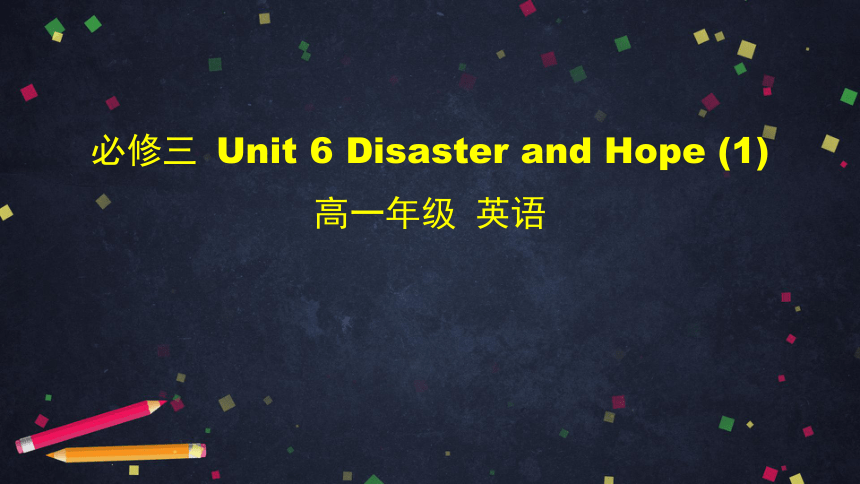
|
|
| 格式 | zip | ||
| 文件大小 | 16.7MB | ||
| 资源类型 | 教案 | ||
| 版本资源 | 外研版(2019) | ||
| 科目 | 英语 | ||
| 更新时间 | 2020-06-28 00:00:00 | ||
图片预览


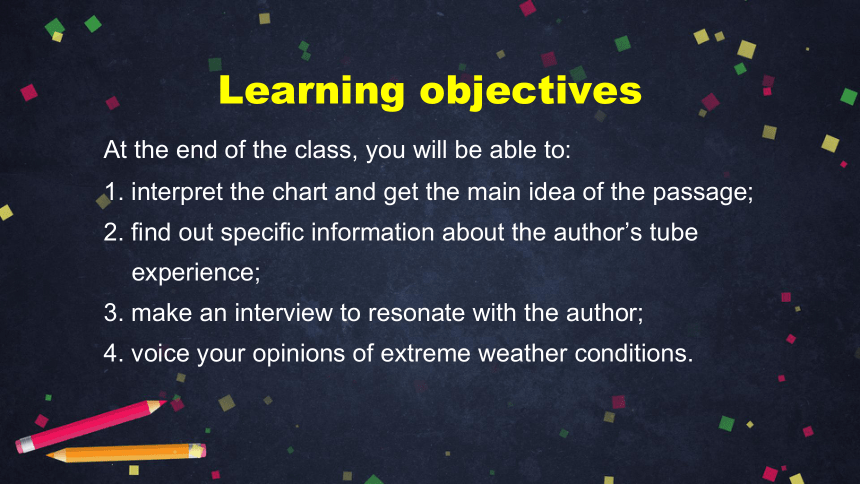
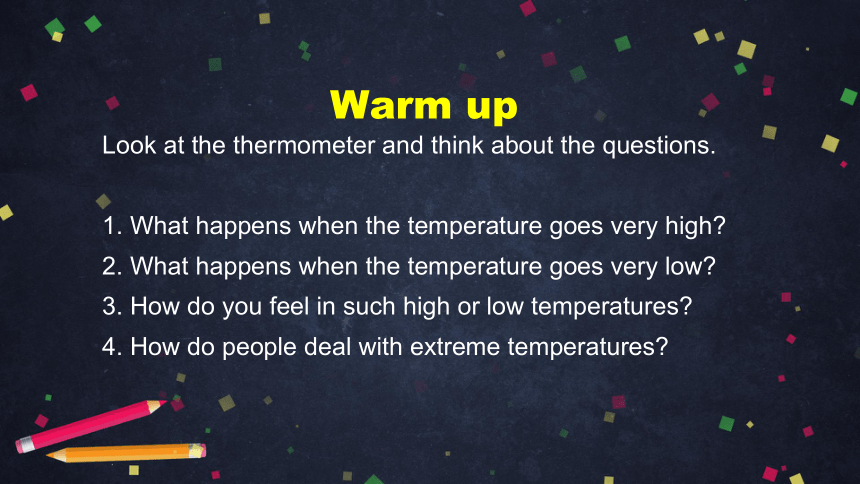
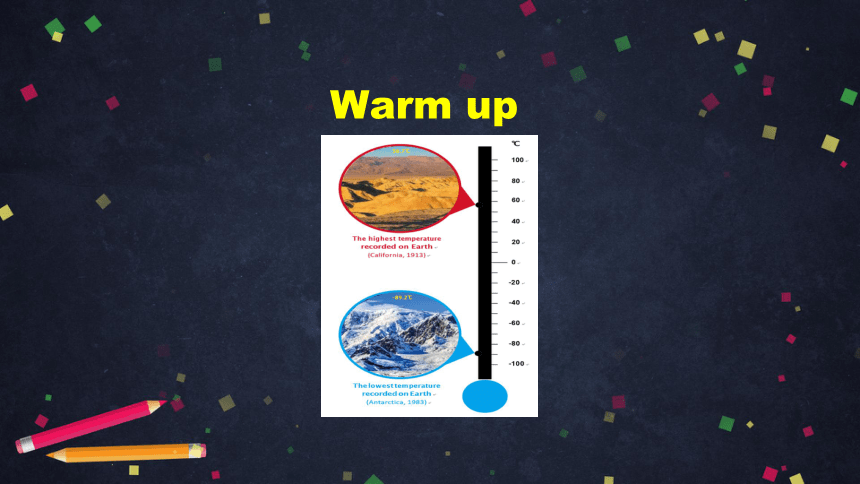
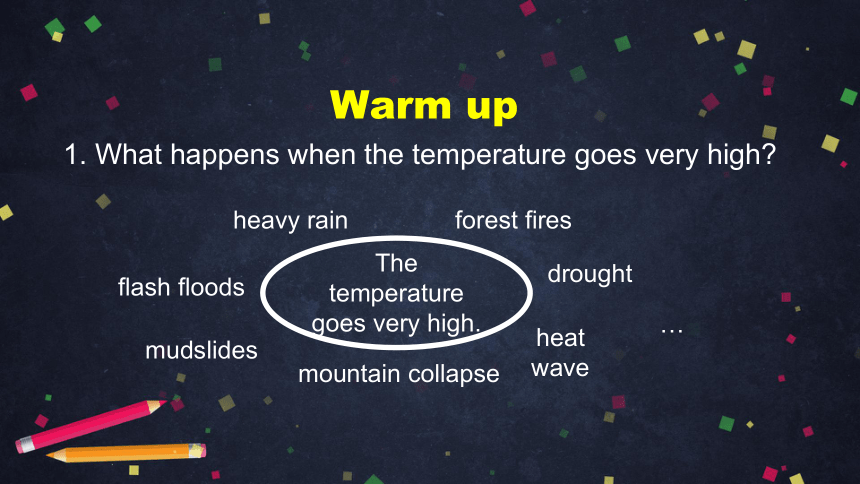
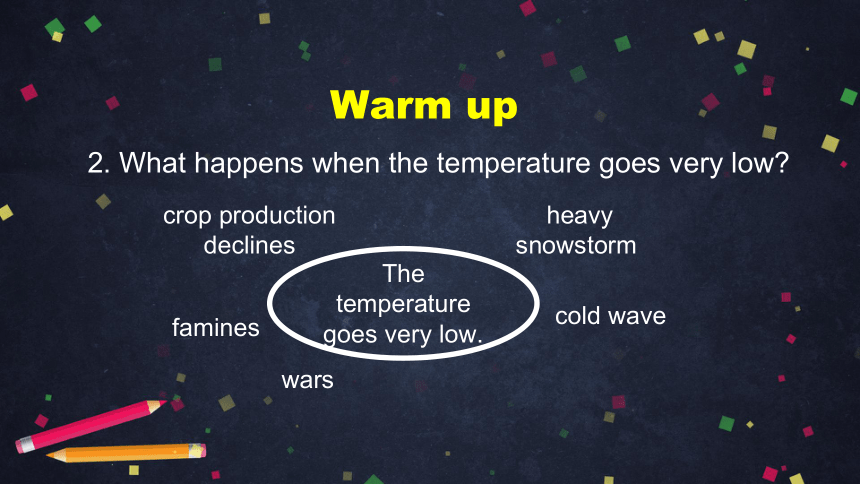
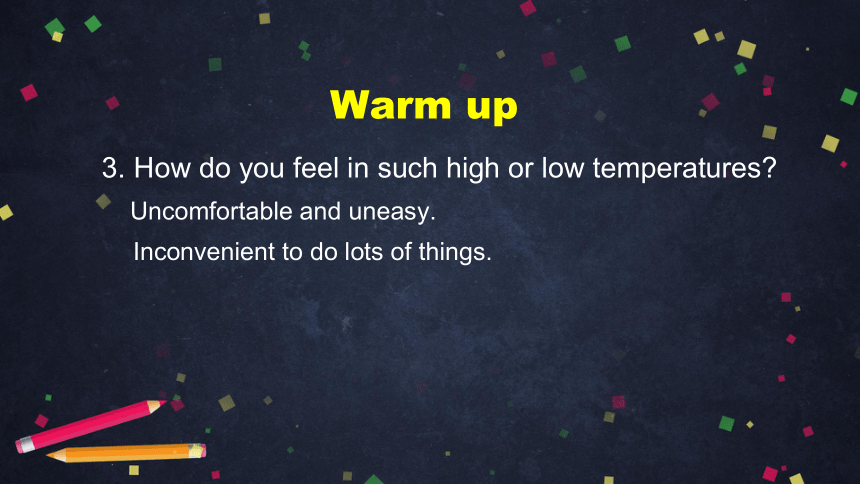
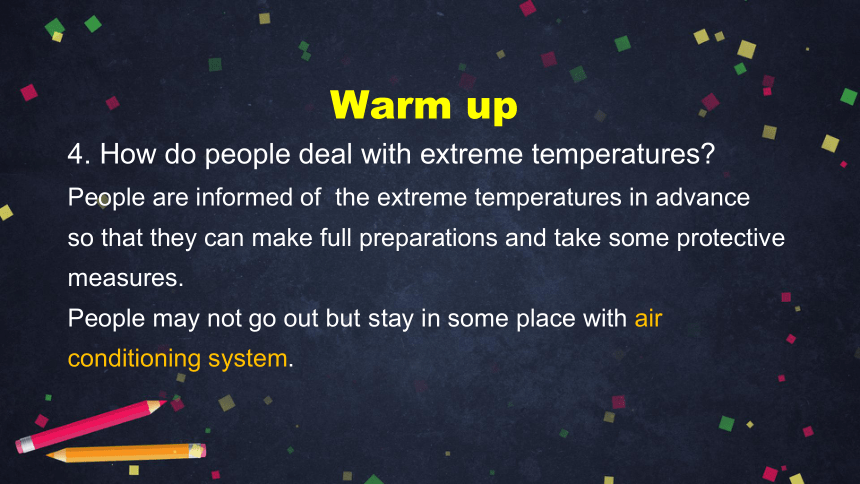
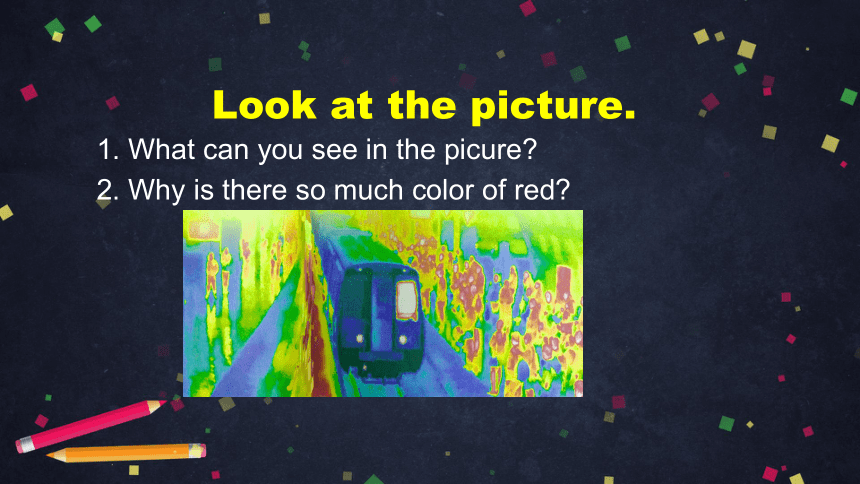
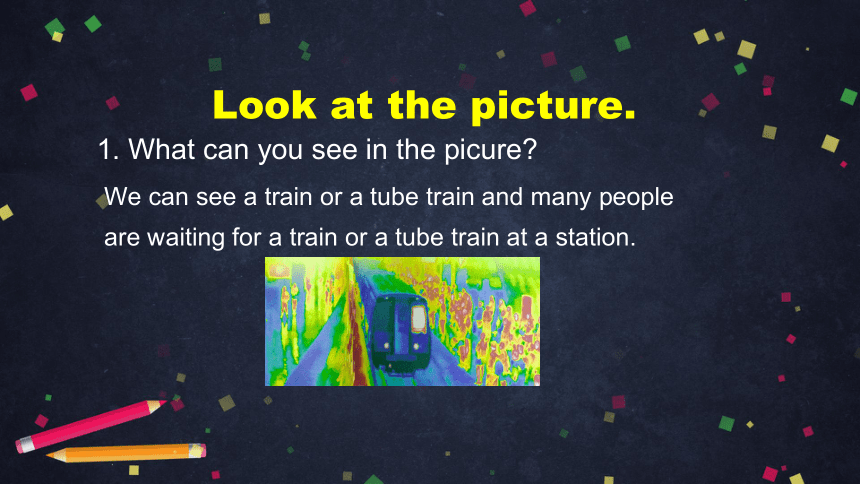
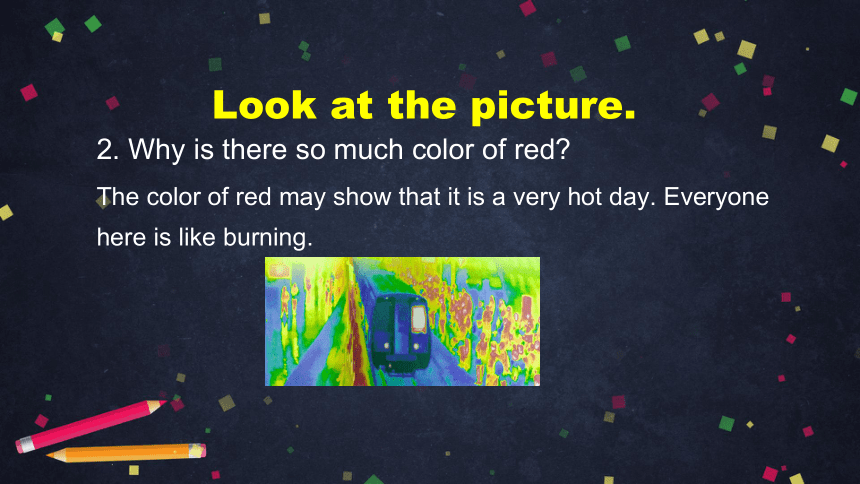
文档简介
(共53张PPT)
必修三
Unit
6
Disaster
and
Hope
(1)
高一年级
英语
Understanding
ideas
Hot!
Hot!
Hot!
Learning
objectives
At
the
end
of
the
class,
you
will
be
able
to:
1.
interpret
the
chart
and
get
the
main
idea
of
the
passage;
2.
find
out
specific
information
about
the
author’s
tube
experience;
3.
make
an
interview
to
resonate
with
the
author;
4.
voice
your
opinions
of
extreme
weather
conditions.
Warm
up
Look
at
the
thermometer
and
think
about
the
questions.
1.
What
happens
when
the
temperature
goes
very
high?
2.
What
happens
when
the
temperature
goes
very
low?
3.
How
do
you
feel
in
such
high
or
low
temperatures?
4.
How
do
people
deal
with
extreme
temperatures?
Warm
up
Warm
up
1.
What
happens
when
the
temperature
goes
very
high?
The
temperature
goes
very
high.
drought
forest
fires
heavy
rain
flash
floods
mudslides
mountain
collapse
heat
wave
…
Warm
up
2.
What
happens
when
the
temperature
goes
very
low?
cold
wave
heavy
snowstorm
crop
production
declines
famines
wars
The
temperature
goes
very
low.
Warm
up
3.
How
do
you
feel
in
such
high
or
low
temperatures?
Uncomfortable
and
uneasy.
Inconvenient
to
do
lots
of
things.
Warm
up
4.
How
do
people
deal
with
extreme
temperatures?
People
are
informed
of
the
extreme
temperatures
in
advance
so
that
they
can
make
full
preparations
and
take
some
protective
measures.
People
may
not
go
out
but
stay
in
some
place
with
air
conditioning
system.
Look
at
the
picture.
1.
What
can
you
see
in
the
picure?
2.
Why
is
there
so
much
color
of
red?
Look
at
the
picture.
1.
What
can
you
see
in
the
picure?
We
can
see
a
train
or
a
tube
train
and
many
people
are
waiting
for
a
train
or
a
tube
train
at
a
station.
Look
at
the
picture.
2.
Why
is
there
so
much
color
of
red?
The
color
of
red
may
show
that
it
is
a
very
hot
day.
Everyone
here
is
like
burning.
Predict
what
the
passage
is
about
according
to
the
picture
and
share
your
reasons
for
your
prediction.
Predict.
Predictions
crowded
situation
the
Tube
system
a
journey
there
the
extremely
hot
weather
conditions
...
Read
the
passage
quickly
to
get
the
main
idea
of
the
passgae
and
check
your
predicitons.
The
passage
is
about
the
author’s
feelings
and
concerns
on
the
London
Tube
on
an
unusually
hot
day.
Reading
for
main
idea
Read
the
passage
and
find
out
the
different
places
where
the
author
is
in
each
paragraph.
Paragraph
1
2
3
4
5
Reading
for
main
idea
at
the
Tube
station
outside
of
Bank
station
in
the
tube
train
Think
about
the
writing
style
and
find
out
the
clues
of
the
passage.
A
narration
Reading
for
main
idea
the
changing
feelings
the
changing
places
Read
the
passage
again
and
list
the
changing
feelings
of
the
author
to
add
more
information
to
your
flow
chart.
Reading
for
main
idea
Read
the
passage
and
find
out
the
different
feelings
of
the
author
in
each
paragraph.
Paragraph
1
2
3
4
5
Reading
for
main
idea
at
the
Tube
station
out
of
Bank
station
in
the
tube
train
awful
melting
and
sick
a
bit
scared
shocked
and
nervous
good
and
refreshed
Read
the
passage
carefully
and
answer
the
following
questions
to
add
more
specific
information
to
your
flow
chart
for
the
second
time.
Reading
for
information
Read
paragraph
1
and
answer
the
question.
Why
does
he
feel
awful
at
the
Tube
station?
Because
it
is
very
hot
and
the
temperature
outside
will
be
over
30
degrees.
He
is
going
to
be
on
the
Central
Line
with
no
air
conditioning,
which
is
one
of
the
oldest
lines,
as
well
as
one
of
the
deepest.
And
it’s
the
hottest
on
the
whole
Tube
system.
Reading
for
information
Read
Paragraph
2
and
find
out
the
reasons
why
he
feels
melting
and
a
bit
sick
inside
the
tube
train?
Because
there
is
no
air
conditioning
inside
the
train
and
it
is
even
hotter
than
outside,
so
he
feels
very
uncomfortable
and
he
hopes
he
can
make
it
to
Bank
station.
Reading
for
information
Read
Paragraph
3
and
answer
the
question.
What
would
he
like
to
do
to
prepare
for
the
future
when
London
gets
hotter
and
hotter?
To
prepare
for
the
future,
he
thinks
he
should:
1.
put
his
flat
on
the
market
and
buy
a
boat.
2.
speak
to
his
manager
about
moving
to
the
top
floor.
3.
learn
to
swim.
Reading
for
information
Read
Paragraph
4
and
answer
the
following
questions.
Q1:
Why
is
he
shocked
when
looking
through
his
newspaper?
Q2:
What
natural
disasters
are
reported
in
the
newspaper
and
what
has
caused
them?
Q3:
What
makes
him
nervous?
Reading
for
information
Read
Paragraph
4
and
answer
the
questions.
Q1:
Why
is
he
shocked
when
looking
through
his
newspaper?
He
is
shocked
by
photos
showing
natural
disasters
and
destruction
caused
by
them.
Reading
for
information
Read
Paragraph
4
and
answer
the
questions.
Q2:
What
natural
disasters
are
reported
in
the
newspaper
and
what
has
caused
them?
Reading
for
information
a
hurricane
destroying
a
town
landslides
casued
by
heavy
rain
forest
fires
caused
by
the
heat
climate
change
Read
Paragraph
4
and
answer
the
questions.
Q3:
What
makes
him
nervous?
News
like
this
makes
him
nervous
and
he
may
be
also
nervous
about
the
future.
Reading
for
information
Read
Paragraph
5
and
find
out
why
he
feels
good
when
he
goes
out
of
the
station.
He
feels
a
fresh
wind
on
his
face
and
it
is
only
30
degrees
outside!
It
is
not
as
hot
as
he
felt
in
the
tube
train
just
now.
Reading
for
information
Paragraph
1
2
3
4
5
Make
a
summary.
awful
melting
and
sick
a
bit
scared
shocked
and
nervous
good
and
refreshed
hot,
no
air
conditoning
hotter
in
the
tube
train
strange
ideas
for
the
future
natural
disasters
a
fresh
wind,
30
degrees
in
the
tube
train
at
the
Tube
station
outside
of
Bank
station
What
is
the
auhtor’s
purpose
in
writing
this
passage?
To
express
his
worries
about
the
dangers
of
extreme
weather
conditions
and
to
tell
us
he
still
has
hopes
for
the
future.
Reading
for
opinions
Paragraph
1
2
3
4
5
awful
melting
and
sick
a
bit
scared
shocked
and
nervous
good
and
refreshed
hot,
no
air
conditoning
hotter
in
the
tube
train
strange
ideas
for
the
future
natural
disasters
a
fresh
wind,
30
degrees
in
the
tube
train
at
the
Tube
station
outside
of
Bank
station
Disaster
and
hope
Make
an
interview
to
talk
about
the
author’s
experience.
Suppose
you
were
a
reporter
from
the
BBC.
Now
you’re
reporting
the
extreme
weather
and
you
want
to
interview
some
citizens.
Here
the
author
is
coming
out
of
the
station.
You
can
make
the
interview
according
to
the
flow
chart.
Application
Reporter:
Good
morning.
I
am
Kathy,
a
reporter
from
the
BBC.
Today
is
extremely
hot
because
of
the
heatwave.
Now
I
am
outside
of
Bank
station.
Let’s
interview
some
people
about
it.
Excuse
me,
could
I
make
an
interview
with
you
about
the
hot
day?
Interviewee:
Yes.
It’s
hot
today
and
I’m
sweaty.
Possible
interview
Reporter:
Which
line
did
you
take
just
now?
Interviewee:
The
Central
Line.
Possible
interview
Reporter:
It
must
be
uncomfortable
in
such
a
tube
without
air
conditioning.
Could
you
share
your
feelings
in
the
tube
train?
Interviewee:
It
is
even
hotter.
I’m
melting
and
becoming
one
with
the
passenger
next
to
me.
Possible
interview
Reporter:
Each
summer
in
London
seems
hotter
than
the
last.
What
do
you
think
of
this?
Interviewee:
I
feel
a
bit
scared.
So
I
have
some
plans
for
the
future.
I
should
put
my
flat
on
the
market
and
buy
a
boat
in
case
there
is
a
flood
in
London.
Possible
interview
And
I
will
speak
with
my
manager
about
moving
my
office
to
the
top
floor.
More
importantly,
I
will
learn
to
swim
so
that
I
can
survive
even
when
the
tall
buildings
are
flooded.
Sounds
strange?
Possible
interview
Reporter:
Yes,
a
little.
What
is
your
feeling
now?
Interviewee:
I
think
I
have
been
worrying
too
much.
When
I
am
stepping
out
of
the
station,
I
feel
a
fresh
wind
on
my
face.
It’s
only
30
degrees!
Reporter:
Everything
will
be
better
and
thank
you
very
much.
Have
a
good
day!
Possible
interview
1.
Do
you
share
the
author’s
concerns
about
extreme
weather
conditions?
Think
and
share.
Possible
answer
I
share
the
author’s
concerns
about
the
extreme
weather
conditions.
In
recent
years,
I
feel
the
summer
in
Beijing
is
hotter
than
before.
I
don’t
want
to
play
outside
anymore.
I
just
want
to
stay
in
room
with
air
conditioner
on.
But
even
so,
I
can’t
focus
on
my
study
because
of
high
temperature.
Possible
answer
Each
time
I
hear
the
news
about
climate
change
causing
many
damages,
I
am
concerned
about
the
future.
So
awful.
It
is
high
time
to
do
something
to
stop
this.
Watch
a
video.
Watch
a
video.
From
this
short
video,
we
can
know
the
leaders
of
many
countries
and
environmentalists
are
also
concerned
about
extreme
weather
conditions.
Extreme
weather
causes
destruction
and
major
loss
of
life.
In
the
year
of
2018,
we
saw
deadly
storms,
wildfires,
floods
and
heatwaves.
Watch
a
video.
If
these
continue
in
the
future,
many
cities,
even
some
countries
may
disappear.
Scientists
once
warned
that
the
year
of
2019
may
be
the
hottest
year
yet.
How
about
the
year
of
2025,
2035
and
2045?
2.
What
causes
extreme
weather
conditions?
How
is
extreme
weather
affecting
our
daily
life?
What
should
we
do
to
contribute
to
preventing
them?
Think
and
share.
Possible
answers
1.
Reasons
for
extreme
weather
conditions.
Extreme
weather
conditions
are
due
to
climate
change,
which
is
related
to
global
warming.
Global
warming
refers
to
an
average
increase
in
the
Earth’s
temperature
that,
in
turn,
leads
to
climate
change.
Possible
answers
1.
Reasons
for
extreme
weather
conditions.
Global
warming
is
mainly
caused
by
human
activities.
As
a
result
of
increased
industry,
agriculture,
the
cutting
down
of
forests,
the
increase
in
transport
and
the
burning
of
fuels,
nearly
6
tonnes
of
carbon
dioxide
gets
into
the
atmosphere
every
year.
Possible
answers
2.
The
effects
of
climate
change
on
our
life.
The
summer
seems
hotter
than
the
last.
It
is
too
hot
to
focus
on
studying.
I
once
suffered
from
tough
traffic
when
raining
heavily.
The
bus
I
took
got
stuck
and
I
was
late
for
school.
My
house
was
flooded
in
2012.
The
furniture
in
the
first
floor
was
ruined
completely.
Possible
answers
3.
Contributions
we
can
make
to
our
environment:
Governments
all
over
the
world
have
a
responsibility
to
reduce
the
amount
of
carbon
dioxide
which
the
countries
are
producing.
For
example,
China
is
committed
to
building
a
community
of
shared
future
for
mankind
and
launched
its
national
carbon
market
in
2017,
using
a
carbon
trading
scheme
to
curb
greenhouse
gas
emission
at
home.
Possible
answers
3.
Contributions
we
can
make:
Each
person
plays
their
part.
We
can
plant
more
trees
to
increase
the
area
of
green
and
go
green
travel
with
low
carbon.
We
can
begin
with
the
switch
to
renewable
energy.
Possible
answers
For
example,
we
can
take
public
transport
or
ride
a
bike.
Recycling
some
materials
is
also
a
good
way
to
save
energy.
In
our
daily
life,
it
is
suggested
that
we’d
better
use
low-flow
shower
heads,
buying
light
bulbs
that
use
less
energy,
using
recycled
paper
and
switching
off
the
lights
when
you
leave
a
room.
Possible
answers
If
we
add
up
all
these
small
changes
made
by
everyone
worldwide,
they
won’t
be
such
small
changes.
They
could
be
the
changes
that
save
our
future.
Summary
1.
Get
the
main
idea
of
the
passage;
2.
Find
out
specific
information
about
the
author’s
experience
in
the
London
Tube
on
an
extremely
hot
day;
3.
Make
an
interview
to
resonate
with
the
author
according
to
the
flow
chart;
4.
Voice
our
opinions
of
extreme
weather
conditions.
Homework
Option
1.
Read
the
passage
and
write
a
summary
according
to
the
flow
chart.
Option
2.
Search
online
to
find
more
reports
about
natural
disasters.
Option
3.
Write
an
essay
on
“climate
change
and
human
beings”.
必修三
Unit
6
Disaster
and
Hope
(1)
高一年级
英语
Understanding
ideas
Hot!
Hot!
Hot!
Learning
objectives
At
the
end
of
the
class,
you
will
be
able
to:
1.
interpret
the
chart
and
get
the
main
idea
of
the
passage;
2.
find
out
specific
information
about
the
author’s
tube
experience;
3.
make
an
interview
to
resonate
with
the
author;
4.
voice
your
opinions
of
extreme
weather
conditions.
Warm
up
Look
at
the
thermometer
and
think
about
the
questions.
1.
What
happens
when
the
temperature
goes
very
high?
2.
What
happens
when
the
temperature
goes
very
low?
3.
How
do
you
feel
in
such
high
or
low
temperatures?
4.
How
do
people
deal
with
extreme
temperatures?
Warm
up
Warm
up
1.
What
happens
when
the
temperature
goes
very
high?
The
temperature
goes
very
high.
drought
forest
fires
heavy
rain
flash
floods
mudslides
mountain
collapse
heat
wave
…
Warm
up
2.
What
happens
when
the
temperature
goes
very
low?
cold
wave
heavy
snowstorm
crop
production
declines
famines
wars
The
temperature
goes
very
low.
Warm
up
3.
How
do
you
feel
in
such
high
or
low
temperatures?
Uncomfortable
and
uneasy.
Inconvenient
to
do
lots
of
things.
Warm
up
4.
How
do
people
deal
with
extreme
temperatures?
People
are
informed
of
the
extreme
temperatures
in
advance
so
that
they
can
make
full
preparations
and
take
some
protective
measures.
People
may
not
go
out
but
stay
in
some
place
with
air
conditioning
system.
Look
at
the
picture.
1.
What
can
you
see
in
the
picure?
2.
Why
is
there
so
much
color
of
red?
Look
at
the
picture.
1.
What
can
you
see
in
the
picure?
We
can
see
a
train
or
a
tube
train
and
many
people
are
waiting
for
a
train
or
a
tube
train
at
a
station.
Look
at
the
picture.
2.
Why
is
there
so
much
color
of
red?
The
color
of
red
may
show
that
it
is
a
very
hot
day.
Everyone
here
is
like
burning.
Predict
what
the
passage
is
about
according
to
the
picture
and
share
your
reasons
for
your
prediction.
Predict.
Predictions
crowded
situation
the
Tube
system
a
journey
there
the
extremely
hot
weather
conditions
...
Read
the
passage
quickly
to
get
the
main
idea
of
the
passgae
and
check
your
predicitons.
The
passage
is
about
the
author’s
feelings
and
concerns
on
the
London
Tube
on
an
unusually
hot
day.
Reading
for
main
idea
Read
the
passage
and
find
out
the
different
places
where
the
author
is
in
each
paragraph.
Paragraph
1
2
3
4
5
Reading
for
main
idea
at
the
Tube
station
outside
of
Bank
station
in
the
tube
train
Think
about
the
writing
style
and
find
out
the
clues
of
the
passage.
A
narration
Reading
for
main
idea
the
changing
feelings
the
changing
places
Read
the
passage
again
and
list
the
changing
feelings
of
the
author
to
add
more
information
to
your
flow
chart.
Reading
for
main
idea
Read
the
passage
and
find
out
the
different
feelings
of
the
author
in
each
paragraph.
Paragraph
1
2
3
4
5
Reading
for
main
idea
at
the
Tube
station
out
of
Bank
station
in
the
tube
train
awful
melting
and
sick
a
bit
scared
shocked
and
nervous
good
and
refreshed
Read
the
passage
carefully
and
answer
the
following
questions
to
add
more
specific
information
to
your
flow
chart
for
the
second
time.
Reading
for
information
Read
paragraph
1
and
answer
the
question.
Why
does
he
feel
awful
at
the
Tube
station?
Because
it
is
very
hot
and
the
temperature
outside
will
be
over
30
degrees.
He
is
going
to
be
on
the
Central
Line
with
no
air
conditioning,
which
is
one
of
the
oldest
lines,
as
well
as
one
of
the
deepest.
And
it’s
the
hottest
on
the
whole
Tube
system.
Reading
for
information
Read
Paragraph
2
and
find
out
the
reasons
why
he
feels
melting
and
a
bit
sick
inside
the
tube
train?
Because
there
is
no
air
conditioning
inside
the
train
and
it
is
even
hotter
than
outside,
so
he
feels
very
uncomfortable
and
he
hopes
he
can
make
it
to
Bank
station.
Reading
for
information
Read
Paragraph
3
and
answer
the
question.
What
would
he
like
to
do
to
prepare
for
the
future
when
London
gets
hotter
and
hotter?
To
prepare
for
the
future,
he
thinks
he
should:
1.
put
his
flat
on
the
market
and
buy
a
boat.
2.
speak
to
his
manager
about
moving
to
the
top
floor.
3.
learn
to
swim.
Reading
for
information
Read
Paragraph
4
and
answer
the
following
questions.
Q1:
Why
is
he
shocked
when
looking
through
his
newspaper?
Q2:
What
natural
disasters
are
reported
in
the
newspaper
and
what
has
caused
them?
Q3:
What
makes
him
nervous?
Reading
for
information
Read
Paragraph
4
and
answer
the
questions.
Q1:
Why
is
he
shocked
when
looking
through
his
newspaper?
He
is
shocked
by
photos
showing
natural
disasters
and
destruction
caused
by
them.
Reading
for
information
Read
Paragraph
4
and
answer
the
questions.
Q2:
What
natural
disasters
are
reported
in
the
newspaper
and
what
has
caused
them?
Reading
for
information
a
hurricane
destroying
a
town
landslides
casued
by
heavy
rain
forest
fires
caused
by
the
heat
climate
change
Read
Paragraph
4
and
answer
the
questions.
Q3:
What
makes
him
nervous?
News
like
this
makes
him
nervous
and
he
may
be
also
nervous
about
the
future.
Reading
for
information
Read
Paragraph
5
and
find
out
why
he
feels
good
when
he
goes
out
of
the
station.
He
feels
a
fresh
wind
on
his
face
and
it
is
only
30
degrees
outside!
It
is
not
as
hot
as
he
felt
in
the
tube
train
just
now.
Reading
for
information
Paragraph
1
2
3
4
5
Make
a
summary.
awful
melting
and
sick
a
bit
scared
shocked
and
nervous
good
and
refreshed
hot,
no
air
conditoning
hotter
in
the
tube
train
strange
ideas
for
the
future
natural
disasters
a
fresh
wind,
30
degrees
in
the
tube
train
at
the
Tube
station
outside
of
Bank
station
What
is
the
auhtor’s
purpose
in
writing
this
passage?
To
express
his
worries
about
the
dangers
of
extreme
weather
conditions
and
to
tell
us
he
still
has
hopes
for
the
future.
Reading
for
opinions
Paragraph
1
2
3
4
5
awful
melting
and
sick
a
bit
scared
shocked
and
nervous
good
and
refreshed
hot,
no
air
conditoning
hotter
in
the
tube
train
strange
ideas
for
the
future
natural
disasters
a
fresh
wind,
30
degrees
in
the
tube
train
at
the
Tube
station
outside
of
Bank
station
Disaster
and
hope
Make
an
interview
to
talk
about
the
author’s
experience.
Suppose
you
were
a
reporter
from
the
BBC.
Now
you’re
reporting
the
extreme
weather
and
you
want
to
interview
some
citizens.
Here
the
author
is
coming
out
of
the
station.
You
can
make
the
interview
according
to
the
flow
chart.
Application
Reporter:
Good
morning.
I
am
Kathy,
a
reporter
from
the
BBC.
Today
is
extremely
hot
because
of
the
heatwave.
Now
I
am
outside
of
Bank
station.
Let’s
interview
some
people
about
it.
Excuse
me,
could
I
make
an
interview
with
you
about
the
hot
day?
Interviewee:
Yes.
It’s
hot
today
and
I’m
sweaty.
Possible
interview
Reporter:
Which
line
did
you
take
just
now?
Interviewee:
The
Central
Line.
Possible
interview
Reporter:
It
must
be
uncomfortable
in
such
a
tube
without
air
conditioning.
Could
you
share
your
feelings
in
the
tube
train?
Interviewee:
It
is
even
hotter.
I’m
melting
and
becoming
one
with
the
passenger
next
to
me.
Possible
interview
Reporter:
Each
summer
in
London
seems
hotter
than
the
last.
What
do
you
think
of
this?
Interviewee:
I
feel
a
bit
scared.
So
I
have
some
plans
for
the
future.
I
should
put
my
flat
on
the
market
and
buy
a
boat
in
case
there
is
a
flood
in
London.
Possible
interview
And
I
will
speak
with
my
manager
about
moving
my
office
to
the
top
floor.
More
importantly,
I
will
learn
to
swim
so
that
I
can
survive
even
when
the
tall
buildings
are
flooded.
Sounds
strange?
Possible
interview
Reporter:
Yes,
a
little.
What
is
your
feeling
now?
Interviewee:
I
think
I
have
been
worrying
too
much.
When
I
am
stepping
out
of
the
station,
I
feel
a
fresh
wind
on
my
face.
It’s
only
30
degrees!
Reporter:
Everything
will
be
better
and
thank
you
very
much.
Have
a
good
day!
Possible
interview
1.
Do
you
share
the
author’s
concerns
about
extreme
weather
conditions?
Think
and
share.
Possible
answer
I
share
the
author’s
concerns
about
the
extreme
weather
conditions.
In
recent
years,
I
feel
the
summer
in
Beijing
is
hotter
than
before.
I
don’t
want
to
play
outside
anymore.
I
just
want
to
stay
in
room
with
air
conditioner
on.
But
even
so,
I
can’t
focus
on
my
study
because
of
high
temperature.
Possible
answer
Each
time
I
hear
the
news
about
climate
change
causing
many
damages,
I
am
concerned
about
the
future.
So
awful.
It
is
high
time
to
do
something
to
stop
this.
Watch
a
video.
Watch
a
video.
From
this
short
video,
we
can
know
the
leaders
of
many
countries
and
environmentalists
are
also
concerned
about
extreme
weather
conditions.
Extreme
weather
causes
destruction
and
major
loss
of
life.
In
the
year
of
2018,
we
saw
deadly
storms,
wildfires,
floods
and
heatwaves.
Watch
a
video.
If
these
continue
in
the
future,
many
cities,
even
some
countries
may
disappear.
Scientists
once
warned
that
the
year
of
2019
may
be
the
hottest
year
yet.
How
about
the
year
of
2025,
2035
and
2045?
2.
What
causes
extreme
weather
conditions?
How
is
extreme
weather
affecting
our
daily
life?
What
should
we
do
to
contribute
to
preventing
them?
Think
and
share.
Possible
answers
1.
Reasons
for
extreme
weather
conditions.
Extreme
weather
conditions
are
due
to
climate
change,
which
is
related
to
global
warming.
Global
warming
refers
to
an
average
increase
in
the
Earth’s
temperature
that,
in
turn,
leads
to
climate
change.
Possible
answers
1.
Reasons
for
extreme
weather
conditions.
Global
warming
is
mainly
caused
by
human
activities.
As
a
result
of
increased
industry,
agriculture,
the
cutting
down
of
forests,
the
increase
in
transport
and
the
burning
of
fuels,
nearly
6
tonnes
of
carbon
dioxide
gets
into
the
atmosphere
every
year.
Possible
answers
2.
The
effects
of
climate
change
on
our
life.
The
summer
seems
hotter
than
the
last.
It
is
too
hot
to
focus
on
studying.
I
once
suffered
from
tough
traffic
when
raining
heavily.
The
bus
I
took
got
stuck
and
I
was
late
for
school.
My
house
was
flooded
in
2012.
The
furniture
in
the
first
floor
was
ruined
completely.
Possible
answers
3.
Contributions
we
can
make
to
our
environment:
Governments
all
over
the
world
have
a
responsibility
to
reduce
the
amount
of
carbon
dioxide
which
the
countries
are
producing.
For
example,
China
is
committed
to
building
a
community
of
shared
future
for
mankind
and
launched
its
national
carbon
market
in
2017,
using
a
carbon
trading
scheme
to
curb
greenhouse
gas
emission
at
home.
Possible
answers
3.
Contributions
we
can
make:
Each
person
plays
their
part.
We
can
plant
more
trees
to
increase
the
area
of
green
and
go
green
travel
with
low
carbon.
We
can
begin
with
the
switch
to
renewable
energy.
Possible
answers
For
example,
we
can
take
public
transport
or
ride
a
bike.
Recycling
some
materials
is
also
a
good
way
to
save
energy.
In
our
daily
life,
it
is
suggested
that
we’d
better
use
low-flow
shower
heads,
buying
light
bulbs
that
use
less
energy,
using
recycled
paper
and
switching
off
the
lights
when
you
leave
a
room.
Possible
answers
If
we
add
up
all
these
small
changes
made
by
everyone
worldwide,
they
won’t
be
such
small
changes.
They
could
be
the
changes
that
save
our
future.
Summary
1.
Get
the
main
idea
of
the
passage;
2.
Find
out
specific
information
about
the
author’s
experience
in
the
London
Tube
on
an
extremely
hot
day;
3.
Make
an
interview
to
resonate
with
the
author
according
to
the
flow
chart;
4.
Voice
our
opinions
of
extreme
weather
conditions.
Homework
Option
1.
Read
the
passage
and
write
a
summary
according
to
the
flow
chart.
Option
2.
Search
online
to
find
more
reports
about
natural
disasters.
Option
3.
Write
an
essay
on
“climate
change
and
human
beings”.
